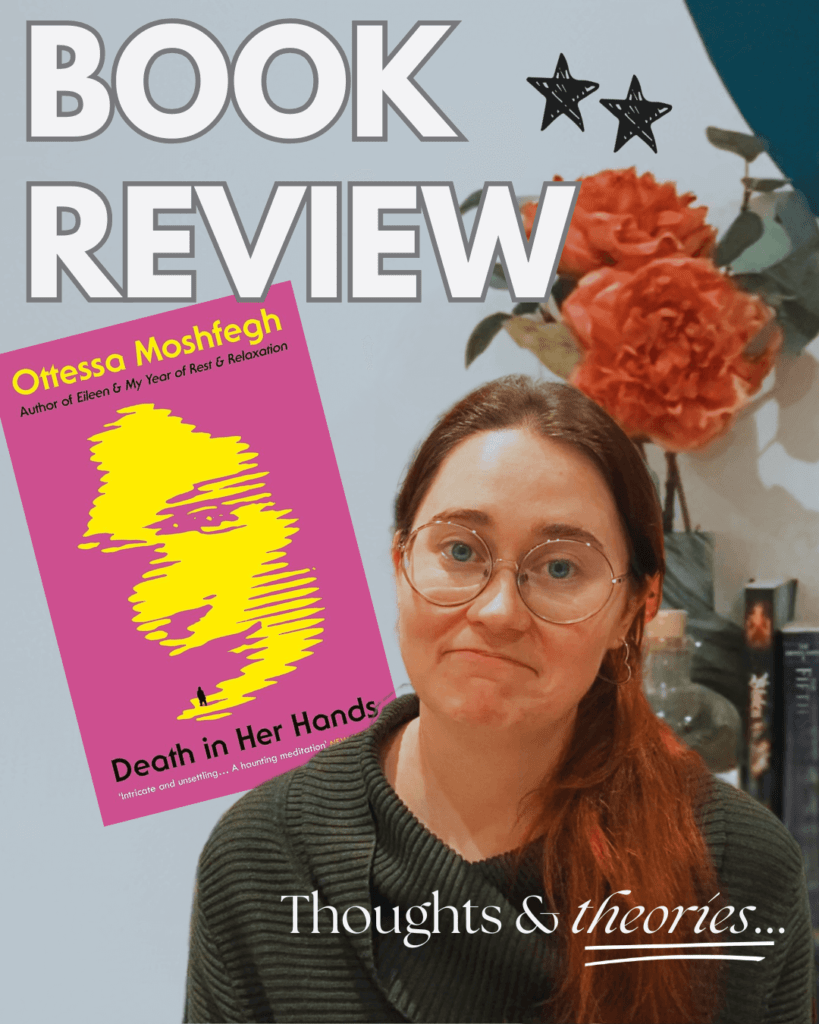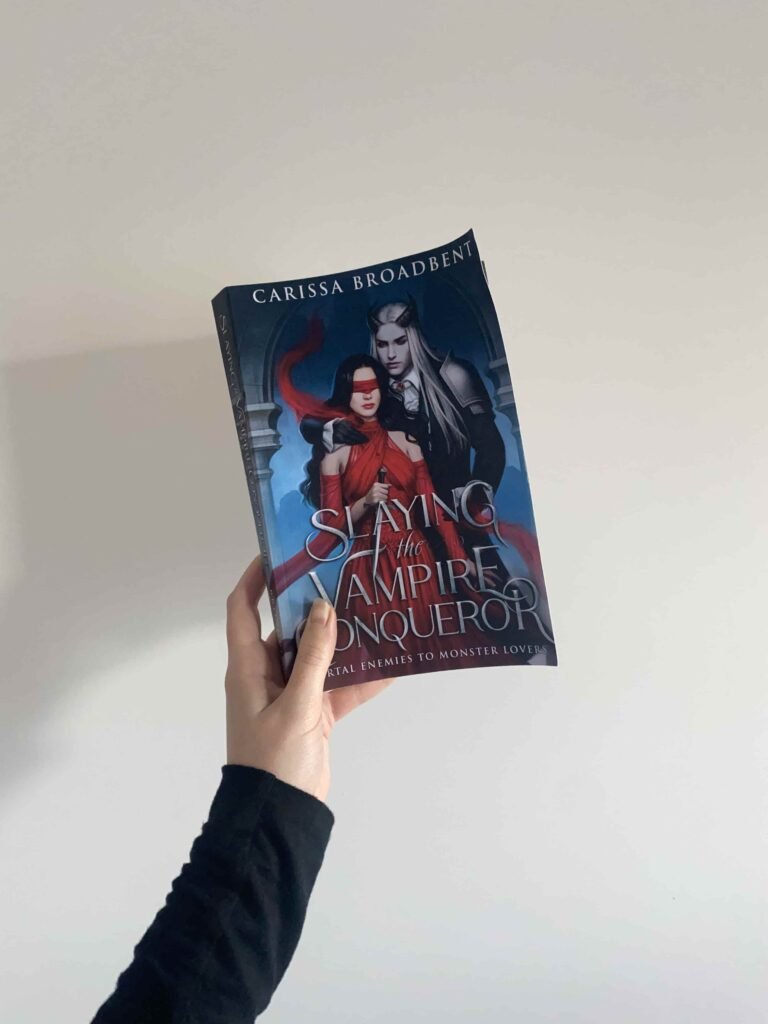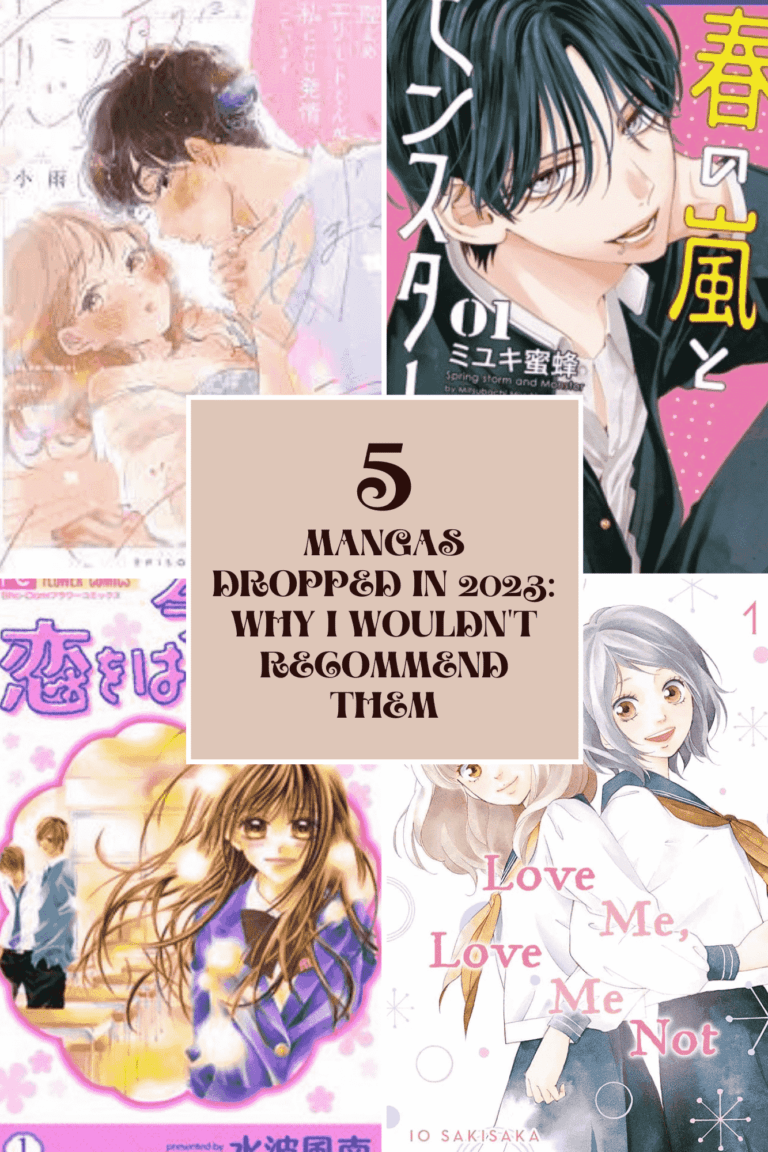Last updated on March 5th, 2024 at 02:01 pm
Ottessa Moshfegh Death in Her Hands book review
I impulsively picked up Death in Her Hands at London’s Brick Lane bookshop, enticed by a craving for a murder mystery and an intriguing cover. Despite high expectations fuelled by praise for Moshfegh’s previous work, the overall experience proved sadly disappointing.
The story follows Vesta, a 72-year-old woman who moved to Levant a year ago after her husband’s death. On her usual morning walk with her dog Charlie, she stumbles upon a note that becomes the epicenter of her obsession: “Her name was Madge. Nobody will ever know who killed her. It wasn’t me. Here is her dead body.” As Vesta delves into solving the mystery of who is Madge, who left the note and importantly who killed her, the reader is taken on a slow-burn journey, marred by pacing issues and an inconsistent writing style.
Watch my honest review on Youtube
An honest review of Death in Her Hands by Ottessa Moshfegh.
The video has a spoiler free and spoilers section which I warn you about during the video so you can watch without worry if you haven’t read the book and don’t want to hear any spoilers. All my thoughts and theories also feature in this blog. Skip to my book rating here.
Thoughts...
This slow-burn whodunit, was… slow! While the concept of a whodunit has potential, the execution falls short. The narrative lacks gripping moments, and attempts to engage are short-lived. Moshfegh’s writing style, characterised by large paragraphs, short sentences, and long, rambly thoughts, hinders the flow. Although this may aim to mirror Vesta’s internal turmoil, it fails to resonate effectively.
That’s not to say I wasn’t creeped out a few times because I was! Though overall, the flow of the book was off and I couldn’t get into Moshfeghs writing style. Vesta’s thoughts were left unfinished and some were extremely random which disrupted the flow. Again this may be the point, but personally it didn’t hit the mark.
Vesta, intentionally unlikable, presents a challenge for me. Her expressed anti-abortion views (several times in the book… why?! It felt so irrelevant to the story), fatphobia, antizignism and problematic comparisons between women and men feel irrelevant and distract from the plot. The repetitive nature of these views almost led me to abandon the book after the third anti-abortion comment.
I ended up sympathise with her at times, due to Vesta’s loneliness and erratic mind, and then outraged by her opinions. These awful view points and long rants did nothing for the plot and her character for me.
The introduction of facts about Vesta’s husband, Walter, unveils a troubled marriage, but the pacing issues create frustration in connecting the dots. As we are fed facts about Vesta’s marriage you notice that she has strong unresolved feelings towards him, and it takes the entire book to cotton on too the point of why we’re told all this (and even then you’re questioning why).
In the end I was left constantly checking the progress bar in StoryGraph compared to being invested in Vesta’s story. The book dragged on to much, the MCs views were horrid and the ending was disappointing and I felt like I’d wasted my time. So many things left unanswered, read my thoughts on this here. Death in Her Hands has a great set-up and in the end it was like a parody of crime and thriller novels, but overall it fell flat.
Although this book didn’t quite align with my preferences, I acknowledge it might be the perfect fit for others. Curious? You can find the book on Amazon or World of Books! If you end up reading it, let me know your thoughts and come back and read through my theories.
Book rating & bio
 /5
/5

Title: Death in Her Hands.
Author: Ottessa Moshfegh.
Genre: Fiction, Slow-burn whodunit, Mystery Thriller.
My Score: 2/5.
Good Reads score: 3.25/5. View book in Good Reads.
StoryGraph score: 3.34/5. View book in StoryGraph.
Publisher: Vintage.
Format: Paperback.
Pages: 259.
Buy on: Amazon | Amazon – Kindle edition | World of books.
While on her daily walk with her dog in the woods near her home, Vesta comes across a chilling handwritten note: Her name was Madge. Nobody will ever know who killed her. It wasn’t me. Here is her dead body.
Shaky even on her best days, Vesta is also alone and new to the area, having moved here after the death of her husband. Her brooding about the note grows quickly into a full-blown obsession: who was Madge and how did she meet her fate?
Disclaimers
Content warning: Fatmisia, antiziganism, grief & loss depiction, animal cruelty, anti abortion.
Spoilers: From this point on there are spoilers within this review.
Disclosure: This blog contains affiliate links, and as an Amazon Associate, I may receive a commission at no extra cost to you if you make a purchase through those links.
Theories and interpretations of Death in her hands
Spoilers ahead don’t read unless you’ve read the book.
Various theories circulate about Vesta’s character and the plot’s purpose, from a self-telling life story to questions about Madge’s existence. Personally, I align with the theory that Vesta projected her experiences onto Madge. The note’s origin seems tied to Vesta’s loneliness and desire for significance, possibly written by her and forgotten due to age or illness.
Other peoples theories
- The plot was a way of telling Vesta’s own life story.
- Madge was a real women killed by either Walter or by Vesta taking revenge on Walter’s infidelities.
- Vesta had been experiencing lapses of consciousness. I think she wrote the original note herself
- Vesta is senile, has an eating disorder, cancer and is a drunk.
- Vesta was secretly abusing Charlie, and forgetting due to her mind or being black out drunk. Which would explain why he turned on her in the final pages.
Personal theory
At points I also questioned whether Madge was a women that Walter slept with or killed in the past and Vesta was imaging her death after discovering the truth once he was dead. Ultimately I think this is far fetched and not the case, but I agree that Vesta projects her own life experiences and self in Madge; looks, experiences with family and friends. Continue on to discover my thoughts on the note, characters and Charlie running away.
For example, she sympathises with characters in the murder mystery that were abusers, which ultimately Walter was one, drawing parallels herself between ‘Henry’ and Walter on page 116.
This is highlighted when she’s describing Henry’s and Madges relationship. In this scenario Henry is the son of the man Madge looks after during the day. Vesta fabricates that Henry is manipulating Madge to sleep with him otherwise he will hand her over to the police to be deported.
Though Madge ends up sympathises with Henry’s disability, and believes he does care for Madge (in a sick way).
The note
I think Vesta wrote the original note she ‘found’ at the start of the book and then forgot she wrote it. I believe she was obsessing about how alone she was, how boring her life was and the fact nobody cared about her. Vesta was writing about herself through Madge, but due to an unknown illness or old age (I’m not sure), she forgot she wrote the note which then set the whole story in motion.
Or the note was part of the murder mystery party that the neighbours were doing. However the only plot hole in this, is that at the end of the book Madge finds notes of her own handwriting that said ‘Her name was Madge, she died and there is nothing you can do about it’. To be this feels like a first draft of her writing down her thoughts about what would happen if she died, no onw would know or do anything about it as she’s so isolates and lonely.
Characters
Another supporting factor that this was all in Vesta’s imagination is that the local towns people worked their way into her murder mystery; Ghod – the police officer, Henry – worked in gas station down the road, Madge – women who phoned into the radio, Shirley and Blake – a mother and son living in the town.
Charlie turning on Vesta and death
I don’t think Vesta was beating Charlie. I believe Charlie saw a change in Vesta’s behaviour over the three days the book takes place. She becomes more erratic, forgets to feed him, leaves him alone longer that she usual would, resulted in him running away.
When Charlie returns, Vesta was wearing the new darkness suit and hasn’t washed in a week (again unusual especially as shes fainted, walked miles that day and not slept properly). Charlie did not recognise Vesta and saw her as an intruder in their home, mainly due to the darkness suit.
In the scene Charlie dies, Vesta sneaks downstairs to shut the door (trapping him in) and is behaving strange staring out the window with the blade in her hand. I think Charlie again, views her as a stanger/ intruder in their home and attacks. I actualy think the story would have ended better if Charlie killed Vesta.
Unanswered questions in Death in her hands
Several unanswered questions linger, such as the peculiar behaviour of the neighbors and the randomness of Vesta buying a darkness suit. The note’s removal and the stones forming a ‘B’ remain unexplained, contributing to a sense of dissatisfaction.
Final thoughts
setup turns into a parody of crime and thriller novels, leaving me with unaddressed questions and a lackluster ending. While not recommending this book, Moshfegh enthusiasts may find it intriguing, but I’m not sure if it aligns with her other acclaimed works. I will be reading Eileen as I’m intrigued to see whether I’d like her other books which have been shortlisted for a few awards!
Happy reading!
In the mean time, check out my Youtube channel, Instagram and Pinterest boards for funny memes more book recommendations and reviews!
Latest blogs
Follow us on socials
*MCs = Main characters, FMC = Female main character, POV = Point of view.



